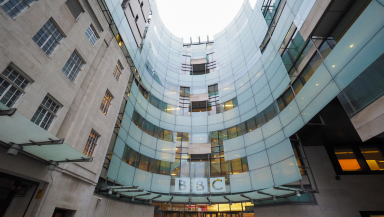
I've been a strong supporter of the BBC for many years. I've even called on Christians to defend the Corporation from its many critics – including those within the Church.
But the BBC's plans to make major cuts to the output of its local radio stations – including axing popular locally-based Sunday morning religious programmes – leave me with no alternative than to join the critics of the UK's national broadcaster. At least, in this important area.
From this autumn, tens of thousands of BBC radio listeners across England will lose their local religious programmes in plans that have been widely criticised and opposed.
The cuts in the Sunday morning shows form just part of a controversial shake-up of the BBC's 39 local stations, with resources being switched from radio to digital output, such as social media and podcasts.
The plans – that include stations sharing programmes after 2pm each weekday – have prompted strikes from BBC journalists and opposition from MPs. Well-known local radio presenters have already lost their jobs.
The BBC says the plans are designed to "strengthen our local online services across news and audio." It maintains that the goal of the overall strategy "is to deliver a local service across TV, radio and online that offers more value to more people in more local communities."
Critics point out that listeners of BBC local radio tend to be older and less familiar with new technology. The loss of familiar presenters with local knowledge will particularly impact those living alone, for whom radio can play an important role in their lives.
The Sunday morning religious programmes – currently attracting an estimated national audience of around 800,000 – are being re-organised into 13 regional groupings – with less scope for news, features and interviews from local churches.
One experienced producer of a faith programme told me: "Six stations sharing a faith show means inevitably the local content will be significantly reduced. The number of guests, interviews or features anchored in each county will drop - from about six per show currently, to probably a maximum of one per station. Some weeks a station or local area might not even have one local story.
"There will be no local reporters getting out into their patch, recording features, connecting with people, making contacts and reflecting faith communities in sound – which is what local radio should be doing."
The producer added: "Stations are also being directed to play an increased amount of music each hour - which will further dilute local output – with often unsuitable songs. The scope for local church services and carol concerts at Christmas and Easter services will be very limited, as bosses want to impose one pre-recorded service for all 39 stations."
Liam McCarthy, former managing editor of three BBC Local Radio stations in Leicester, Nottingham and Sheffield pointed out: "One of the key public purposes of the BBC is 'to reflect, represent and serve the diverse communities' of the United Kingdom.
"The changes to BBC local radio currently being pushed through by the Corporation's senior management in England will seriously affect the ability of BBC local radio to meet this challenge."
The reduction in local on-air broadcasting will do little to build the BBC's reputation with churches. It will also dilute the beleaguered Corporation's commitment to faith issues, grassroots communities and older listeners.
The Bishop of Norwich, Graham Usher, is among religious leaders who have expressed concerns about the cuts. He tweeted: "Really depressing news about the cuts to BBC local radio, particularly BBC Radio Norfolk's flagship Sunday morning show which carries such important news, debate and discussion about and from faith communities."
The Church of England has long been perceived as a friend of the BBC, with bishops speaking out in favour of its key role in British public life. Other Christians have been less supportive and more wary of the Corporation's approach to faith. Recent years have seen the growth of new Christian TV and radio channels in direct opposition to the BBC.
Churches and other faith groups tend to have strong local roots and historic connections with their communities - the CofE has a network of 13,000 parishes that cover every inch of England.
So the dilution of the BBC's commitment to the local, and to many of the more vulnerable people in local areas, is unlikely to win it friends in the churches.
At a time when the Corporation is under pressure from all sides, and the future of the licence fee is under review, it seems a bad move for the BBC to alienate many people who might normally be its supporters.
Rev Peter Crumpler is a Church of England minister in St Albans, Herts, UK, and a former communications director with the CofE.













